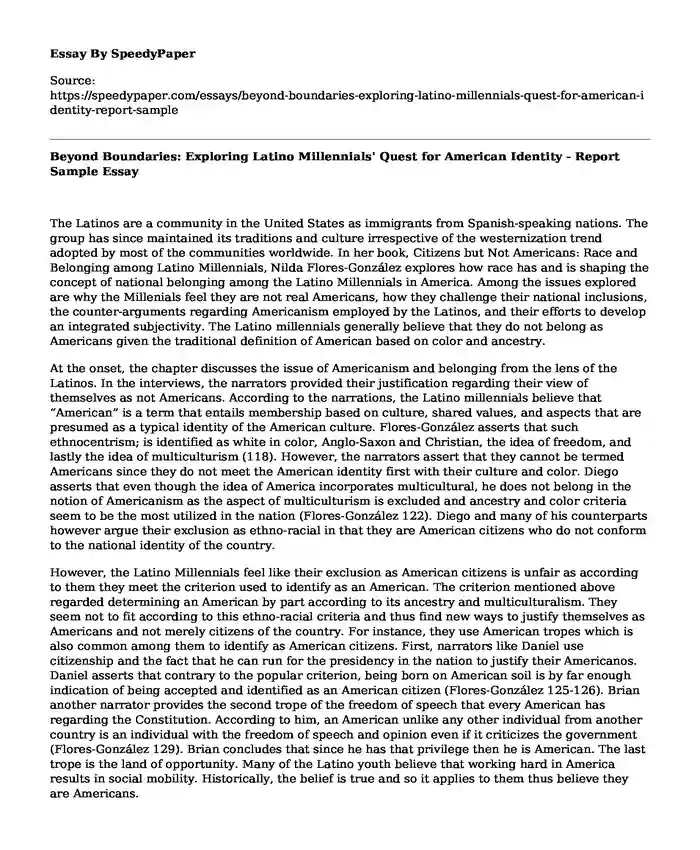
| Type of paper: | Essay |
| Categories: | Culture United States Community |
| Pages: | 3 |
| Wordcount: | 691 words |
The Latinos are a community in the United States as immigrants from Spanish-speaking nations. The group has since maintained its traditions and culture irrespective of the westernization trend adopted by most of the communities worldwide. In her book, Citizens but Not Americans: Race and Belonging among Latino Millennials, Nilda Flores-González explores how race has and is shaping the concept of national belonging among the Latino Millennials in America. Among the issues explored are why the Millenials feel they are not real Americans, how they challenge their national inclusions, the counter-arguments regarding Americanism employed by the Latinos, and their efforts to develop an integrated subjectivity. The Latino millennials generally believe that they do not belong as Americans given the traditional definition of American based on color and ancestry.
At the onset, the chapter discusses the issue of Americanism and belonging from the lens of the Latinos. In the interviews, the narrators provided their justification regarding their view of themselves as not Americans. According to the narrations, the Latino millennials believe that “American” is a term that entails membership based on culture, shared values, and aspects that are presumed as a typical identity of the American culture. Flores-González asserts that such ethnocentrism; is identified as white in color, Anglo-Saxon and Christian, the idea of freedom, and lastly the idea of multiculturism (118). However, the narrators assert that they cannot be termed Americans since they do not meet the American identity first with their culture and color. Diego asserts that even though the idea of America incorporates multicultural, he does not belong in the notion of Americanism as the aspect of multiculturism is excluded and ancestry and color criteria seem to be the most utilized in the nation (Flores-González 122). Diego and many of his counterparts however argue their exclusion as ethno-racial in that they are American citizens who do not conform to the national identity of the country.
However, the Latino Millennials feel like their exclusion as American citizens is unfair as according to them they meet the criterion used to identify as an American. The criterion mentioned above regarded determining an American by part according to its ancestry and multiculturalism. They seem not to fit according to this ethno-racial criteria and thus find new ways to justify themselves as Americans and not merely citizens of the country. For instance, they use American tropes which is also common among them to identify as American citizens. First, narrators like Daniel use citizenship and the fact that he can run for the presidency in the nation to justify their Americanos. Daniel asserts that contrary to the popular criterion, being born on American soil is by far enough indication of being accepted and identified as an American citizen (Flores-González 125-126). Brian another narrator provides the second trope of the freedom of speech that every American has regarding the Constitution. According to him, an American unlike any other individual from another country is an individual with the freedom of speech and opinion even if it criticizes the government (Flores-González 129). Brian concludes that since he has that privilege then he is American. The last trope is the land of opportunity. Many of the Latino youth believe that working hard in America results in social mobility. Historically, the belief is true and so it applies to them thus believe they are Americans.
When Flores-González asserts that the Latino millennials develop an integrated subjectivity she implies the concept of a co-existence of two conflicting cultures in one person. Manuel asserts that they received an upbringing of typical American citizens with their parents encouraging them to mold with the American community (Flores-González 144). However, this happened simultaneously with the incorporation of the Latino culture just Like in the introductory part where the paper identified that the Latinos maintained their cultures and traditions despite living in America; away from home. Such a dual coexistence of American and Latino identity is what Flores-González identifies as an integrated subjectivity.
Work Cited
Flores-González, Nilda. Citizens but not Americans: Race and belonging among Latino millennials. Vol. 8. NYU Press, 2017.
Cite this page
Beyond Boundaries: Exploring Latino Millennials' Quest for American Identity - Report Sample. (2024, Jan 19). Retrieved from https://speedypaper.com/essays/beyond-boundaries-exploring-latino-millennials-quest-for-american-identity-report-sample
Request Removal
If you are the original author of this essay and no longer wish to have it published on the SpeedyPaper website, please click below to request its removal:
- Free Essay on Community-Based Juvenile Corrections Services
- Law Essay Example: Consequences of Dred Scott's Case
- Essay Example: The Impact of World War II on America's Home Front
- Themes in the Cold War Era - Paper Example
- Free Essay: UNSCOP Analysis Paper
- Free Essay Sample: Civil Rights Movement in United States
- Recreation Visitor Safety - Report Sample
Popular categories




